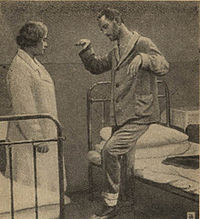
Photo from wikipedia
Postoperative delirium (POD) is a complication characterized by disturbances in attention, awareness, and cognitive function that occur shortly after surgery or emergence from anesthesia. Since it occurs prevalently in neurosurgical… Click to show full abstract
Postoperative delirium (POD) is a complication characterized by disturbances in attention, awareness, and cognitive function that occur shortly after surgery or emergence from anesthesia. Since it occurs prevalently in neurosurgical patients and poses great threats to the well-being of patients, much emphasis is placed on POD in neurosurgical units. However, there are intricate theories about its pathogenesis and limited pharmacological interventions for POD. In this study, we review the recent insights into its pathogenesis, mainly based on studies within five years, and the five dominant pathological theories that account for the development of POD, with the intention of furthering our understanding and boosting its clinical management.
Journal Title: Brain Sciences
Year Published: 2022
Link to full text (if available)
Share on Social Media: Sign Up to like & get
recommendations!